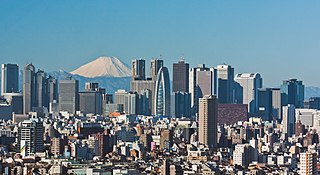
The Acts of Union were two Acts of Parliament: the Union with Scotland Act 1706 passed by the Parliament of England, and the Union with England Act passed in 1707 by the Parliament of Scotland. They put into effect the terms of the Treaty of Union that had been agreed on 22 July 1706, following negotiation between commissioners representing the parliaments of the two countries. By the two Acts, the Kingdom of England and the Kingdom of Scotland—which at the time were separate states with separate legislatures, but with the same monarch—were, in the words of the Treaty, "United into One Kingdom by the Name of Great Britain".
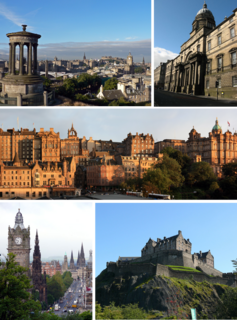
Edinburgh is the capital city of Scotland and one of its 32 council areas. Historically part of the county of Midlothian, it is located in Lothian on the Firth of Forth's southern shore.

Mary, Queen of Scots, also known as Mary Stuart or Mary I of Scotland, reigned over Scotland from 14 December 1542 to 24 July 1567.
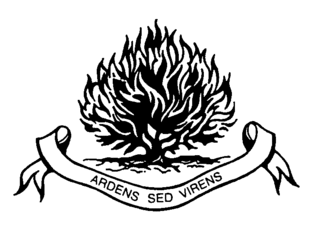
Presbyterianism is a part of the reformed tradition within Protestantism, which traces its origins to Britain, particularly Scotland.

The Six Nations Championship is an annual international rugby union competition between the teams of England, France, Ireland, Italy, Scotland and Wales. The current champions are Ireland, who won the 2018 tournament.

Robert I, popularly known as Robert the Bruce, was King of Scots from 1306 until his death in 1329. Robert was one of the most famous warriors of his generation, and eventually led Scotland during the First War of Scottish Independence against England. He fought successfully during his reign to regain Scotland's place as an independent country and is today revered in Scotland as a national hero.

Scotland is a country that is part of the United Kingdom. Sharing a border with England to the southeast, Scotland is otherwise surrounded by the Atlantic Ocean to the north and west, by the North Sea to the northeast and by the Irish Sea to the south. In addition to the mainland, situated on the northern third of the island of Great Britain, Scotland has over 790 islands, including the Northern Isles and the Hebrides.

Scottish Gaelic or Scots Gaelic, sometimes also referred to simply as Gaelic, is a Celtic language native to the Gaels of Scotland. A member of the Goidelic branch of the Celtic languages, Scottish Gaelic, like Modern Irish and Manx, developed out of Middle Irish. Most of modern Scotland was once Gaelic-speaking, as evidenced especially by Gaelic-language placenames.

The United Kingdom, officially the United Kingdom of Great Britain and Northern Ireland but more commonly known as the UK or Britain, is a sovereign country lying off the north-western coast of the European mainland. The United Kingdom includes the island of Great Britain, the north-eastern part of the island of Ireland and many smaller islands. Northern Ireland is the only part of the United Kingdom that shares a land border with another sovereign state—the Republic of Ireland. Apart from this land border, the United Kingdom is surrounded by the Atlantic Ocean, with the North Sea to the east, the English Channel to the south and the Celtic Sea to the south-west, giving it the 12th-longest coastline in the world. The Irish Sea lies between Great Britain and Ireland. With an area of 242,500 square kilometres (93,600 sq mi), the United Kingdom is the 78th-largest sovereign state in the world. It is also the 22nd-most populous country, with an estimated 66.0 million inhabitants in 2017.

Sir William Wallace was a Scottish knight who became one of the main leaders during the First War of Scottish Independence.

Scots is the Germanic language variety spoken in Lowland Scotland and parts of Ulster in Ireland. It is sometimes called Lowland Scots to distinguish it from Scottish Gaelic, the Celtic language which was historically restricted to most of the Highlands, the Hebrides and Galloway after the 16th century. The Scots language developed during the Middle English period as a distinct entity.

Glasgow is the most populous city in Scotland, and the third most populous city in the United Kingdom, as of the 2017 estimated city population of 621,020. Historically part of Lanarkshire, the city now forms the Glasgow City council area, one of the 32 council areas of Scotland; the local authority is Glasgow City Council. Glasgow is situated on the River Clyde in the country's West Central Lowlands. Inhabitants of the city are referred to as "Glaswegians" or "Weegies". It is the fourth most visited city in the UK. Glasgow is also known for the Glasgow patter, a distinct dialect of the Scots language that is noted for being difficult to understand by those from outside the city.
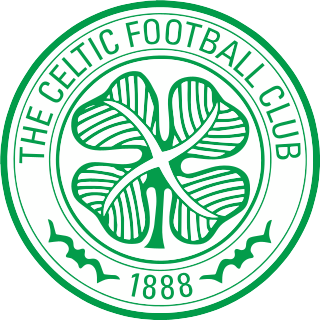
The Celtic Football Club are a professional football club based in Glasgow, Scotland, which plays in the Scottish Premiership. The club was founded in 1887 with the purpose of alleviating poverty in the immigrant Irish population in the East End of Glasgow. They played their first match in May 1888, a friendly match against Rangers which Celtic won 5–2. Celtic established themselves within Scottish football, winning six successive league titles during the first decade of the 20th century. The club enjoyed their greatest successes during the 1960s and 70s under Jock Stein when they won nine consecutive league titles and the 1967 European Cup.

Rangers Football Club are a football club in Glasgow, Scotland, who play in the Scottish Premiership, the first tier of the Scottish Professional Football League. Although it is not part of the official name, they are occasionally referred to as Glasgow Rangers; their home ground, Ibrox Stadium, is in the south-west of the city in the Govan district.

The House of Stuart, originally Stewart, was a European royal house of Scotland with Breton origin. They had held the office of High Steward of Scotland since Walter FitzAlan in around 1150. The royal Stewart line was founded by Robert II whose descendants were kings and queens of Scotland from 1371 until the union with England in 1707. Mary, Queen of Scots was brought up in France where she adopted the French spelling of the name Stuart.

James VI and I was King of Scotland as James VI from 24 July 1567 and King of England and Ireland as James I from the union of the Scottish and English crowns on 24 March 1603 until his death in 1625. The kingdoms of Scotland and England were individual sovereign states, with their own parliaments, judiciaries, and laws, though both were ruled by James in personal union.

The Scotland national football team represents Scotland in international football and is controlled by the Scottish Football Association. It competes in the three major professional tournaments, the FIFA World Cup, UEFA Nations League and the UEFA European Championship. Scotland, as a constituent country of the United Kingdom, is not a member of the International Olympic Committee and therefore the national team does not compete in the Olympic Games. The majority of Scotland's home matches are played at the national stadium, Hampden Park.

The Scotland national rugby union team is administered by the Scottish Rugby Union. The team takes part in the annual Six Nations Championship and participates in the Rugby World Cup, which takes place every four years. As of 19 November 2018, Scotland are 7th in the World Rugby Rankings.
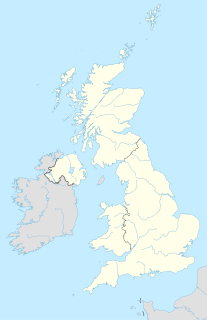
The United Kingdom (UK) comprises four countries: England, Scotland and Wales and Northern Ireland.

The Scottish people or Scots, are a nation and ethnic group native to Scotland. Historically, they emerged from an amalgamation of two Celtic-speaking peoples, the Picts and Gaels, who founded the Kingdom of Scotland in the 9th century. Later, the neighbouring Celtic-speaking Cumbrians, as well as Germanic-speaking Anglo-Saxons and Norse, were incorporated into the Scottish nation.

